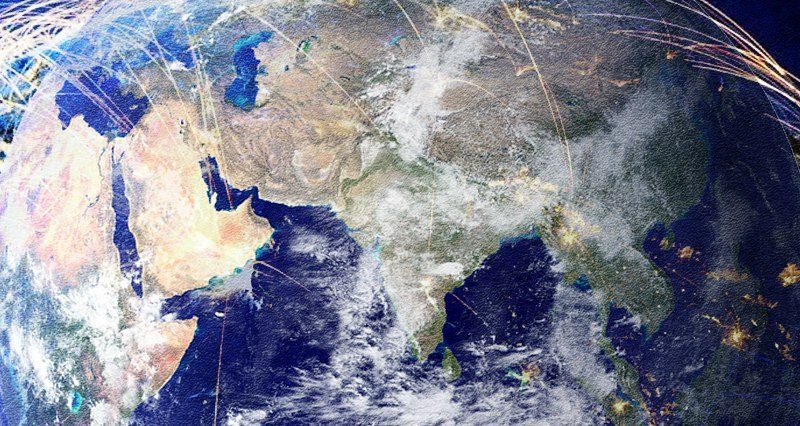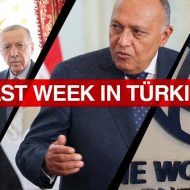In recent years, three events have accelerated the process of building the new world:
1. The Covid19 pandemic
The pandemic revealed the inability of the international system and capitalism to confront a common enemy of all humanity. It was a stellar moment to coordinate actions and agree to cooperate, but this was impossible because the interest to keep the economy functioning and ensuring profits took precedence over health and worrying about safeguarding the lives of human beings. The richest country on the planet with 330 million inhabitants saw almost 1.2 million citizens die due to the inability to protect its own population. At the opposite extreme, in China with 1.4 billion inhabitants, 120 thousand citizens died. The different way in which both systems care for the health of citizens was brought to the fore, revealing the contrast between those countries that invest in public health and those that consider it a market good. This fact began the process of global transformation.
2. Russia’s Special Military Operation (SMO) in Ukraine
Given the inability of the international system to prevent the genocide against the Russian-speaking population in eastern Ukraine from continuing, given the danger of expansion of Nazism that took that country as the basis of its global flourishing and in consideration of the serious risk that presented the expansion of NATO for its own peace, that of the region and the world, Russia was forced to initiate an SMO on Ukrainian territory. Beyond the development of the conflict in its local and regional dimension, the impact it is having at a global level must be considered. On March 21, 2023, during a visit to Moscow while saying goodbye, Xi Jinping told his Sussian counterpart: “Things are happening that did not happen since 100 years”, and referring to their countries, he concluded: “ …And we are the protagonists.” That sentence sets out what is happening: Changes never seen before in more than a century.
This is transcendental at a time when the United States accentuates its hegemonic crisis, materialized in a perceptible weakening of one of its pillars: The Dollar, a vital part of its force diplomacy focused on aggressive unilateralism. The other instrument of dominance, in which it still retains relevant capacity and great distance from its adversaries, is in the cultural and media sphere.
While bilateral trade agreements to use national currencies grow (India, Iran, Dubai, Malaysia, Pakistan, Saudi Arabia, Sri Lanka, among others), Russia and China created their own payment system: The BRICS are also moving away from the Dollar, planning a common fiduciary currency; Brazil and China agreed to trade with their currencies, and a number of African countries are considering trading backed by securities on rare earths or metals. Although a massive exit from the Dollar is not in sight in the short term, this is an inexorable path regardless of the time it takes to occur. The abusive streak of sanctions that has already crossed tolerance and affects thirty regions and nations with a devastating socioeconomic impact has accelerated this process. The way the United States abuses its monetary preponderance is part of a risky diplomacy of force.
According to the Chinese newspaper Global Times, in an article with the suggestive name “Dedollarization is inevitable,” the decline of hegemony often begins with its currency. 10 years ago, 80% of trade between China and Russia was carried out in dollars, while today 90% is in Yuan and Rubles.
The Association of Southeast Asian Nations (ASEAN), in a recent meeting, contemplated abandoning the Dollar and other currencies. The BRICS group is moving towards creating a new currency that can replace the US dollar, starting with the use of its local currencies. As said before, China and Brazil have made the decision to carry out mutual trade in Yuan, abandoning the dollar while announcing that the supply of food, minerals and high value-added goods will be expanded. Trade between China and Brazil reached a record figure equivalent to 150 billion dollars (a figure that cannot be ignored) and is no longer being traded in that currency to move to the yuan.
The global strategic space is ceasing to be the Atlantic in favor of Eurasia. Zbigniew Brzezinski warned that “the most dangerous scenario (for the status of the United States as a global power) would be a grand coalition of China, Russia and perhaps Iran […] an anti-hegemonic coalition.”
The reconciliation between Saudi Arabia and Iran thanks to the good offices of China opens that area of the planet to an era of peace in a region that is the largest buyer of weapons in the world, thereby weakening the United States economically, financially and politically.
For their part, Europe and other key allies of the United States are seeking to get out of the “hole” they got themselves into. France seeks investments in China, Spain breaks record for purchasing Russian oil, Germany renewed Nord Stream insurance, Japan turned its back on Washington to buy Russian oil at market price, Saudi Arabia preferred to reach an agreement with Russia and the OPEC, instead of following Washington’s dictates of increasing supply. The president of France, Emmanuel Macron, recommended that Europe design a project of “strategic autonomy” to not depend “on others on critical issues, because the day we run out of room for maneuver on issues such as energy, defense, networks social or artificial intelligence, the day we run out of the necessary structure on these issues, we will be left out of the rhythm of history.” That is already happening.
On the other hand, in Africa, Chad recently expelled the German ambassador,Jan-Christian Gordon accusing him of “interfering in the country’s internal politics” and making “derogatory and biased comments that can disrupt social cohesion.” The president of that country Idriss Déby criticized the ambassador for having a “discourteous attitude” and a “lack of respect in diplomatic practices.”
The president of Namibia, Hage Geingob, (now deceased) bluntly stopped the German ambassador Herbert Beck who complained that there were more Chinese than Germans in that country. Ghanaian President Nana Akufo-Addo said that “the United States is obsessed with China’s activities in Africa.” For his part, the president of Kenya, William Ruto, recommended his population get rid of the Dollar. Likewise, the president of Rwanda, Paul Kagame, rejected the BBC’s instructive attitude, and reminded the channel that it was European governments that changed the borders of Africa at will, generating territorial conflicts that did not exist, spreading hatred among African peoples that led to in current wars.
The President of Uganda, Yoweri Museveni, said that European politicians were “insufferable” and that “they think they know everything, but they are wrong to display their ignorance wherever they go.” The Government of Burkina Faso annulled a 62-year-old military aid agreement with France and ordered it to withdraw its troops. Mali declared the United Nations Human Rights chief persona ‘non grata’, at the same time that it forced France to withdraw its military contingent from the country, where they were participating in anti-terrorist military operations without completing them.
The president of the Democratic Republic of the Congo, Felix Tshisekedi, told his French counterpart, Emmanuel Macron: “Look at us in a different way, respecting each other, considering each other as true partners and not always with a paternalistic view, with the idea of always knowing what we need”.
In Gabon, Macron was forced to announce that “the era of ‘French Africa’ is over,” regretting that his country is still seen as interfering in the internal affairs of African nations.
Who would have thought it just a few years ago? The world is changing and everything has accelerated thanks to Russia’s SMO in Ukraine?
In the background, what is in crisis are the higher interests of global capitalism that undauntedly observes the loss of its all-embracing power. Ukraine is just a despicable instrument for the West in the quest to achieve its primary objective which is to save capitalism at the time of its greatest and growing weakness. In particular, it is seen that throughout history the United States has never – when it comes to preserving its system – cared about sacrificing millions of lives, including those of the humble American citizens who make up its army. Its 800 military bases around the world and its 11 aircraft carriers are the most important instruments it has to “solve” the problems posed by international law.
During the last five centuries, that is, since globalization hegemonized by the West began, world power was based on the control of the seas. That has begun to change, generating a paradigmatic transformation in which the United States is being left out. The creation of a large Eurasian space on land based on the alliance between Russia and China establishes new parameters in the structuring of world power. It must be considered that it was Western thinkers such as the Englishman Halford Mackinder and the American of Dutch origin Nicholas Spykman, who argued that the control of Central Asia, as a “continental heart” or “pivot area”, would lead to the control of the world.
In recent years, the Russian-Chinese alliance has reached the peak of its strength after the joint declaration of February 4, 2022 signed by the presidents of both countries in Beijing. This in practice manifests the decision to take the first steps towards creation of a new world order. After the defeat and flight from Afghanistan by the United States and NATO and after the failure of the coups in Kyrgyzstan in January 2020 and in Kazakhstan in January 2022, the inability of the United States to dominate has been highlighted that strategic territory of the planet, beyond its success in the overthrow of the Prime Minister of Pakistan, Imran Khan in April 2022 in an operation plotted by Washington and executed by its local accomplices.
The Eurasian alliance has been realized through the operation of several organizations. One of them, the Collective Security Treaty Organization (CSTO), which showed its effectiveness, preventing the coup d’état in Kazakhstan. Another instance created and that has shown its effectiveness is the Shanghai Cooperation Organization (SCO), where China, Russia, Kazakhstan, Kyrgyzstan and Tajikistan participate as founding members. They later joined Uzbekistan, India, Pakistan and Iran with the aim of cooperating in political, economic and security matters. Belarus, Mongolia and Afghanistan are awaiting approval for entry. In the same way, the Eurasian Union made up of five countries constitutes the successful extension of economic and commercial ties in the largest land space on the planet.
China, for its part, promoted and created the largest economic alliance in the world, the Regional Comprehensive Economic Partnership (RCEP). This association is made up of 30% of the world’s population. But the area with the greatest scope in the region and the world is the new Silk Road project developed by China for which it has so far allocated 900,000 million dollars distributed among 72 countries, with a population of about 5,000 million inhabitants. 65% of the world’s population, according to Belgian journalist Marc Vandepitte in a recent article.
The great danger for the United States and its system of world dominance is the incorporation of Europe and in particular Germany into this system. If this were to happen, the entire hegemonic structure built after the Second World War, which has its political support in Western-style representative democracy, in the United Nations Organization, its instrument of global control, in NATO, the military support of pressure, blackmail and threat and the Bretton Woods System established from Western control of the World Bank and the International Monetary Fund, as the pillars to economically and financially sustain its global hegemony. The subordination and control of Europe is essential to sustain this model designed since the Marshall Plan was put into practice after the end of the Second World War.
The fundamental objective of US policy has been to prevent energy integration agreements from being produced between Russia and Europe that could seal a mutually beneficial strategic alliance for both parties that, in addition, would link Europe with China, leaving the United States away from the possibility of continue to maintain energy supremacy in Europe, which together with NATO constitute the guarantee of control of the Old Continent by the United States.
3. Israel’s invasion of Gaza
Although it is a very recent event, which prevents a complete systematization of the repercussions it may have on the international system, it is worth analyzing the events in Western Asia as an event that gives continuity to the previous two and as an expression of the transformative dynamics in the planet, For now, the Zionist-imperialist axis has been questioned from a political, military, diplomatic and even legal point of view. Something also unthinkable just a few months ago.
The new coalitions and alliances that are being produced between Arab and Muslim countries on three continents and their search to open a space beyond the region through agreements with other bodies such as the Shanghai Cooperation Organization, the Route of Silk, the North-South Corridor and above all the BRICS are an expression of a new reality, especially when we are talking about the region that occupies first place in the world in energy production…and in the purchase of weapons.
The increasing proximity of these countries to Russia and China and the more relevant role that these two powers are playing as articulators of negotiation processes and the search for agreements in favor of peace and détente, generate a new moment on the planet.
The axis of this situation was the beginning of the “Al-Quds Flood” operation by the Palestinian political and military forces and its support by the resistance axis through various concrete demonstrations of solidarity and support, especially from Yemen. Iran, Lebanon, Syria and Iraq, as well as the majority of Arab and Muslim peoples, often in open contradiction with their governments.
The Saudi-Iranian agreement for the reestablishment of diplomatic relations had a great influence on this happening, creating a much more advantageous situation in the region for the struggle of the Palestinian people, isolating the United States and the Zionist entity.
By way of conclusion, it could be pointed out that, seeing the situation from the perspective presented, it could be stated that progress is being made towards an unprecedented international system, never before explained and unthought of even in the most recent past. In an article in the Mexican newspaper La Jornada, the award-winning American economist Joseph Stiglitz believes that: “It seems that the United States has started a new cold war.”
But unlike that of the last century in which the ideological element was the order of international relations, Stiglitz affirms that in the face of American hypocrisy that bases its views on a supposed defense of democracy, the current one “… makes one think that, at least in part, what is at stake here is global hegemony rather than a question of values.”
The avalanche of international events of different characteristics in recent months shows the intensity with which the main protagonists are moving on the international stage and the whirlwind of negotiations in which they are involved. It is necessary to take action on the matter in this very chaotic and effervescent world in which the empire increases its aggressiveness while struggling in a multi-sector crisis from which – as they see it – they can only escape through war and a permanent conflict that ensures it increases its income through its main industry: the production and sale of weapons.
Thus, we arrive at this original and strange situation framed in the possibility of that new cold war that Stiglitz speaks of. What is new is that bipolarity manifests itself differently. On the one hand, the Western pole calling itself the “international community” made up of 11% of the planet’s population and around 54 countries in the global north, which functions inwards in unipolar terms with the United States acting in a hegemonic manner and having Europe, Australia, New Zealand and Japan as obedient subordinates, even to the detriment of their own citizens.
The other pole, made up of the vast majority of humanity, has proposed to build a great multipolar environment in which various centers of world power can participate in a space of cooperation and help that was already evident in the fight against the pandemic.
In this area of confrontations and definitions, the validity and persistence of an international law built after centuries of searching for peace on the planet is compared against the US proposal to establish “an international system based on rules” as a form of unilateral imposition of its imperial logic. At this point it is no longer known what the role of the UN will be in the future. If it continues to exist, it will be necessary to define under what conditions it will do so, when we observe that NATO has taken over the main multilateral organization on the planet.









Leave a Reply